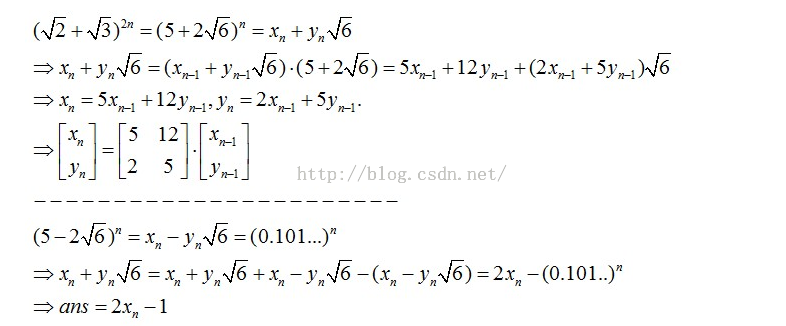Best Solver
Time Limit: 1500/1000 MS (Java/Others) Memory Limit: 65535/102400 K (Java/Others)
Total Submission(s): 408 Accepted Submission(s): 219
Problem Description
The so-called best problem solver can easily solve this problem, with his/her childhood sweetheart.
It is known that y=(5+26√)1+2x.
For a given integer x (0≤x<232) and a given prime number M (M≤46337), print [y]%M. ([y] means the integer part of y)
It is known that y=(5+26√)1+2x.
For a given integer x (0≤x<232) and a given prime number M (M≤46337), print [y]%M. ([y] means the integer part of y)
Input
An integer T (1<T≤1000), indicating there are T test cases.
Following are T lines, each containing two integers x and M, as introduced above.
Following are T lines, each containing two integers x and M, as introduced above.
Output
The output contains exactly T lines.
Each line contains an integer representing [y]%M.
Each line contains an integer representing [y]%M.
Sample Input
7
0 46337
1 46337
3 46337
1 46337
21 46337
321 46337
4321 46337
Sample Output
Case #1: 97
Case #2: 969
Case #3: 16537
Case #4: 969
Case #5: 40453
Case #6: 10211
Case #7: 17947
Source


/** 题意:对于方程 给出x和mod,求y向下取整后取余mod的值为多少 做法:矩阵 构造 **/ #include <iostream> #include <cstdio> #include <vector> #include <cmath> #include <algorithm> using namespace std; typedef long long ll; ll mod; typedef vector<ll> vec; typedef vector<vec> mat; mat mul(mat& A, mat& B) { mat C(A.size(), vec(B[0].size())); for(int i = 0; i < A.size(); ++i) { for(int k = 0; k < B.size(); ++k) { for(int j = 0; j < B[0].size(); ++j) { C[i][j] = (C[i][j] + A[i][k] * B[k][j]) % mod; } } } return C; } mat pow(mat A, ll n) { mat B(A.size(), vec(A.size())); for(int i = 0; i < A.size(); ++i) { B[i][i] = 1; } while(n > 0) { if(n & 1) { B = mul(B, A); } A = mul(A, A); n >>= 1; } return B; } int solve(long long a, long long b, long long c) { long long ans = 1; long long k = a % c; while(b > 0) { if(b % 2 == 1) { ans = (ans * k) % c; } b = b / 2; k = (k * k) % c; } return ans; } int main() { int T; scanf("%d", &T); ll a, b, n; int Case = 1; while(T--) { scanf("%I64d %I64d", &n, &mod); mat A(2, vec(2, 0)); A[0][0] = 5; A[0][1] = 12; A[1][0] = 2; A[1][1] = 5; long long tt = mod; n = solve(2, n, (mod - 1) * (mod + 1)) + 1; A = pow(A, n); ll ans = (2 * A[0][0] - 1) % mod; printf("Case #%d: %I64d ", Case++, ans); } return 0; }
